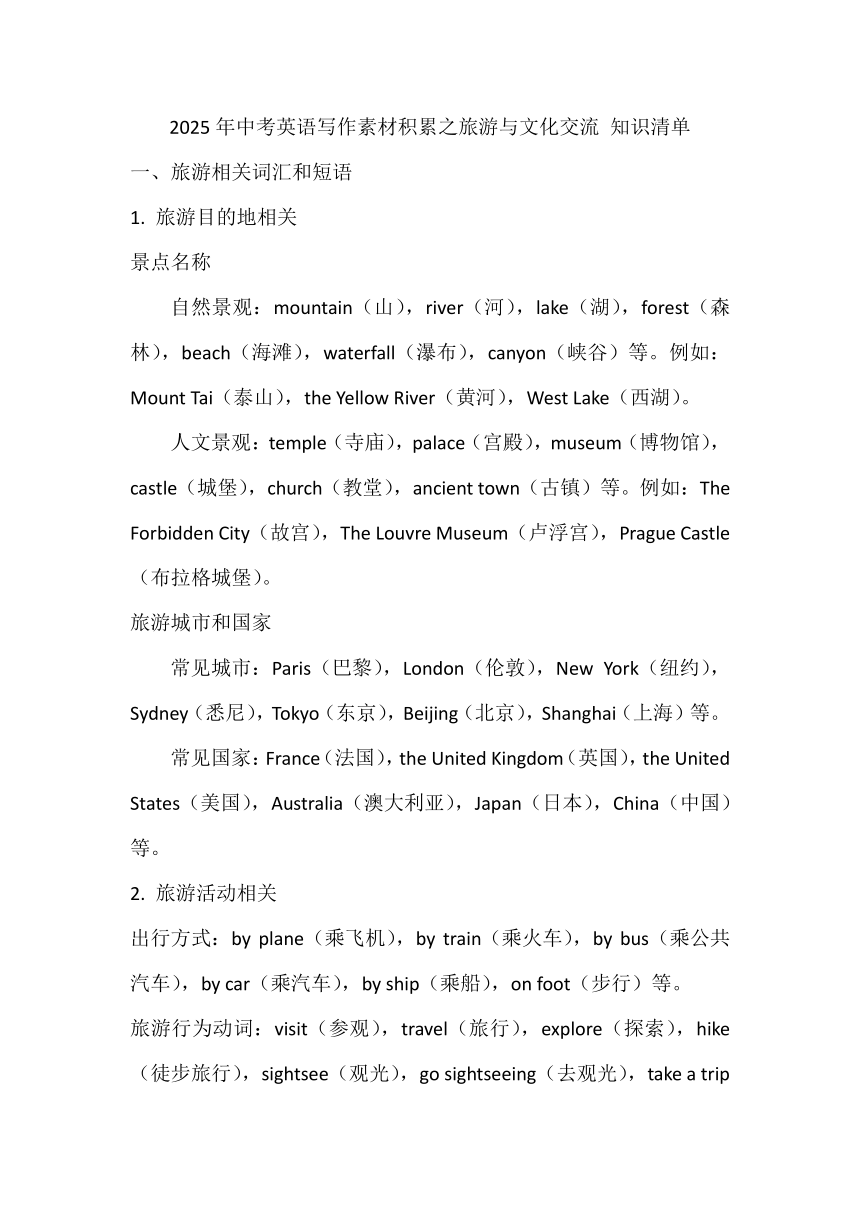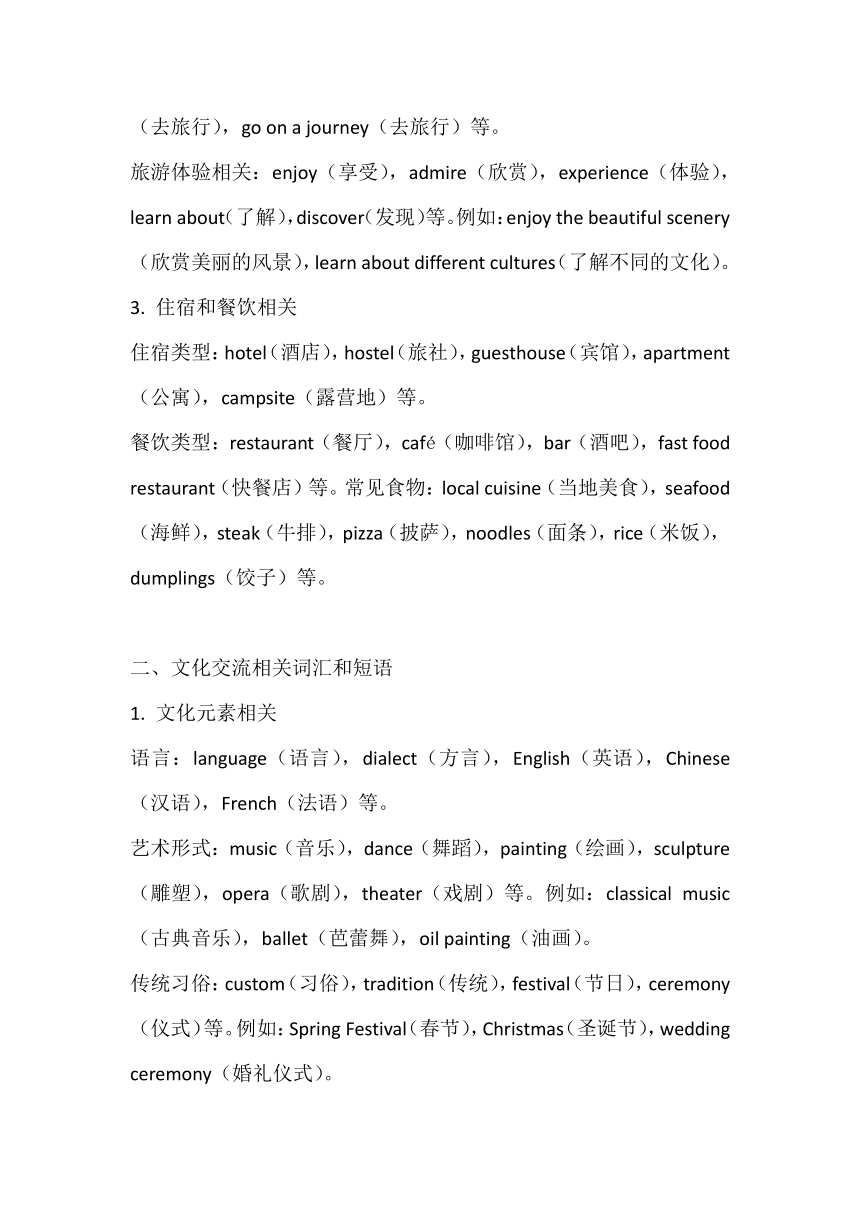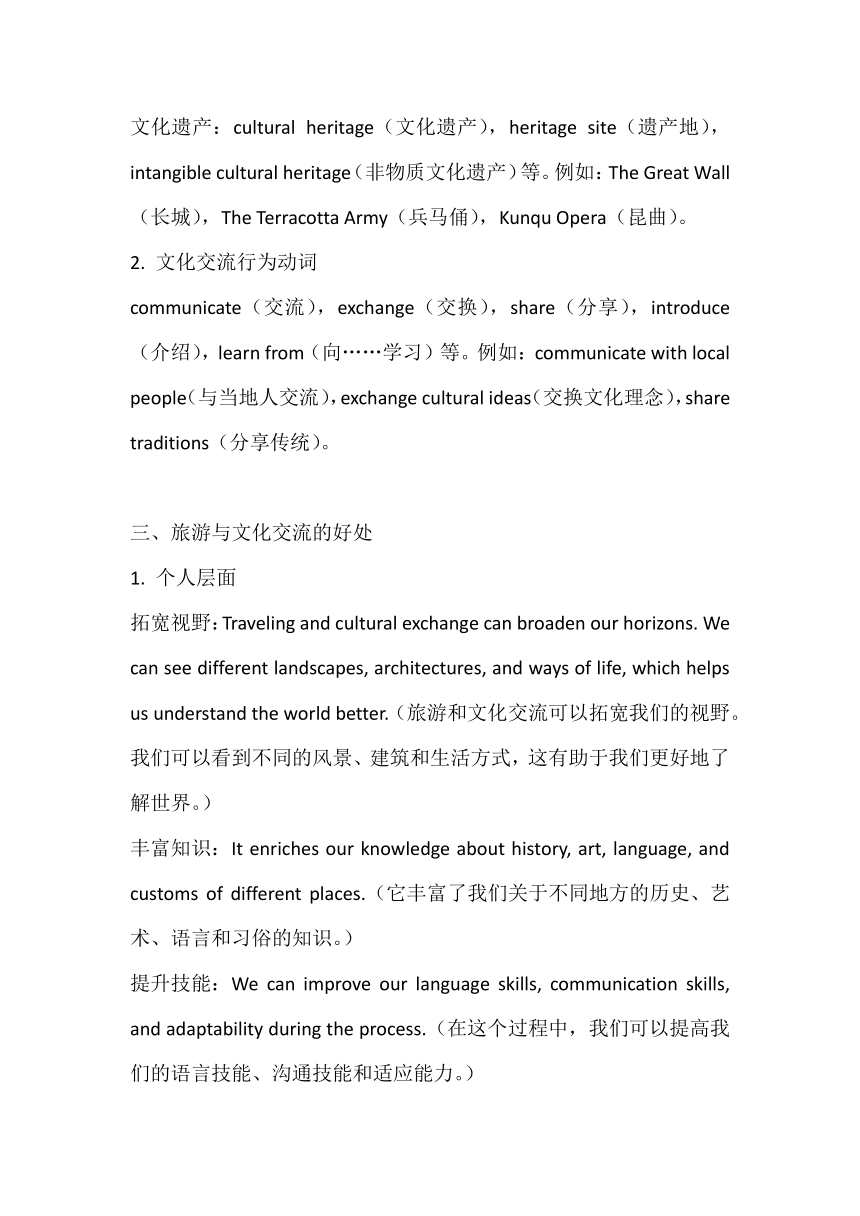2025年中考英语写作素材积累之旅游与文化交流 知识清单
文档属性
| 名称 | 2025年中考英语写作素材积累之旅游与文化交流 知识清单 |

|
|
| 格式 | docx | ||
| 文件大小 | 21.0KB | ||
| 资源类型 | 教案 | ||
| 版本资源 | 人教新目标(Go for it)版 | ||
| 科目 | 英语 | ||
| 更新时间 | 2024-10-22 00:00:00 | ||
图片预览



文档简介
2025年中考英语写作素材积累之旅游与文化交流 知识清单
一、旅游相关词汇和短语
1. 旅游目的地相关
景点名称
自然景观:mountain(山),river(河),lake(湖),forest(森林),beach(海滩),waterfall(瀑布),canyon(峡谷)等。例如:Mount Tai(泰山),the Yellow River(黄河),West Lake(西湖)。
人文景观:temple(寺庙),palace(宫殿),museum(博物馆),castle(城堡),church(教堂),ancient town(古镇)等。例如:The Forbidden City(故宫),The Louvre Museum(卢浮宫),Prague Castle(布拉格城堡)。
旅游城市和国家
常见城市:Paris(巴黎),London(伦敦),New York(纽约),Sydney(悉尼),Tokyo(东京),Beijing(北京),Shanghai(上海)等。
常见国家:France(法国),the United Kingdom(英国),the United States(美国),Australia(澳大利亚),Japan(日本),China(中国)等。
2. 旅游活动相关
出行方式:by plane(乘飞机),by train(乘火车),by bus(乘公共汽车),by car(乘汽车),by ship(乘船),on foot(步行)等。
旅游行为动词:visit(参观),travel(旅行),explore(探索),hike(徒步旅行),sightsee(观光),go sightseeing(去观光),take a trip(去旅行),go on a journey(去旅行)等。
旅游体验相关:enjoy(享受),admire(欣赏),experience(体验),learn about(了解),discover(发现)等。例如:enjoy the beautiful scenery(欣赏美丽的风景),learn about different cultures(了解不同的文化)。
3. 住宿和餐饮相关
住宿类型:hotel(酒店),hostel(旅社),guesthouse(宾馆),apartment(公寓),campsite(露营地)等。
餐饮类型:restaurant(餐厅),café(咖啡馆),bar(酒吧),fast food restaurant(快餐店)等。常见食物:local cuisine(当地美食),seafood(海鲜),steak(牛排),pizza(披萨),noodles(面条),rice(米饭),dumplings(饺子)等。
二、文化交流相关词汇和短语
1. 文化元素相关
语言:language(语言),dialect(方言),English(英语),Chinese(汉语),French(法语)等。
艺术形式:music(音乐),dance(舞蹈),painting(绘画),sculpture(雕塑),opera(歌剧),theater(戏剧)等。例如:classical music(古典音乐),ballet(芭蕾舞),oil painting(油画)。
传统习俗:custom(习俗),tradition(传统),festival(节日),ceremony(仪式)等。例如:Spring Festival(春节),Christmas(圣诞节),wedding ceremony(婚礼仪式)。
文化遗产:cultural heritage(文化遗产),heritage site(遗产地),intangible cultural heritage(非物质文化遗产)等。例如:The Great Wall(长城),The Terracotta Army(兵马俑),Kunqu Opera(昆曲)。
2. 文化交流行为动词
communicate(交流),exchange(交换),share(分享),introduce(介绍),learn from(向……学习)等。例如:communicate with local people(与当地人交流),exchange cultural ideas(交换文化理念),share traditions(分享传统)。
三、旅游与文化交流的好处
1. 个人层面
拓宽视野:Traveling and cultural exchange can broaden our horizons. We can see different landscapes, architectures, and ways of life, which helps us understand the world better.(旅游和文化交流可以拓宽我们的视野。我们可以看到不同的风景、建筑和生活方式,这有助于我们更好地了解世界。)
丰富知识:It enriches our knowledge about history, art, language, and customs of different places.(它丰富了我们关于不同地方的历史、艺术、语言和习俗的知识。)
提升技能:We can improve our language skills, communication skills, and adaptability during the process.(在这个过程中,我们可以提高我们的语言技能、沟通技能和适应能力。)
2. 社会层面
促进文化理解与包容:It promotes cultural understanding and tolerance among different countries and ethnic groups. People can respect and appreciate each other's cultures, reducing misunderstandings and conflicts.(它促进了不同国家和民族之间的文化理解和包容。人们可以尊重和欣赏彼此的文化,减少误解和冲突。)
推动文化传承与发展:By sharing and learning, different cultures can be preserved and developed. Some traditional arts and crafts may gain more attention and support.(通过分享和学习,不同的文化可以得到保护和发展。一些传统的手工艺可能会获得更多的关注和支持。)
四、旅游与文化交流中可能遇到的问题及解决方法
1. 语言障碍
问题描述:When traveling in a foreign country, language barriers may cause difficulties in communication, such as ordering food, asking for directions, and understanding local information.(在国外旅游时,语言障碍可能会导致沟通困难,比如点餐、问路和理解当地信息。)
解决方法:Learning some basic phrases and sentences of the local language before traveling is helpful. Using body language and translation apps can also assist in communication.(在旅行前学习一些当地语言的基本短语和句子是有帮助的。使用肢体语言和翻译应用程序也可以帮助沟通。)
2. 文化差异
问题描述:Cultural differences may lead to misunderstandings. For example, different gestures, taboos, and social norms may make people feel confused or even offended.(文化差异可能会导致误解。例如,不同的手势、禁忌和社会规范可能会让人感到困惑甚至被冒犯。)
解决方法:Respecting local cultures and traditions is crucial. Reading about the local culture before traveling and asking for explanations when in doubt can avoid misunderstandings.(尊重当地的文化和传统是至关重要的。在旅行前了解当地文化,有疑问时询问解释可以避免误解。)
3. 安全问题
问题描述:Safety is an important concern during travel. There may be risks such as theft, fraud, and accidents.(安全是旅行期间的一个重要问题。可能存在盗窃、诈骗和事故等风险。)
解决方法:Taking necessary precautions such as keeping valuables safe, being aware of the surroundings, and following local safety regulations can ensure a safer trip.(采取必要的预防措施,如保管好贵重物品、注意周围环境和遵守当地的安全规定,可以确保旅行更安全。)
范文:
Travel and Cultural Exchange
In recent years, travel has become an increasingly popular activity, which not only allows people to explore different places but also facilitates cultural exchange.
Traveling to various destinations offers us a wonderful opportunity to witness the beauty of diverse landscapes and architectures. We can climb majestic mountains, stroll along sandy beaches, and admire ancient palaces and temples. These experiences broaden our horizons and let us appreciate the wonders of nature and human creativity.
Moreover, cultural exchange is an essential part of travel. When we visit a foreign country or a different region, we are exposed to unique languages, traditions, arts, and cuisines. We can communicate with local people, learn about their way of life, and share our own culture. For example, during the Spring Festival, many Chinese tourists traveling abroad introduce the traditions of this important festival to the locals, such as having a family reunion dinner, setting off fireworks, and giving red envelopes. In return, we can also experience foreign festivals like Christmas and understand their cultural significance.
Through cultural exchange in travel, we gain a deeper understanding and respect for different cultures. It helps to break down cultural barriers and promotes global harmony. We realize that despite our differences, we all share common values and aspirations.
However, there are also some challenges in travel and cultural exchange. Language barriers may make communication difficult, but we can learn some basic phrases of the local language or use translation apps to overcome this problem. Cultural differences may lead to misunderstandings, but with an open mind and a respectful attitude, we can avoid these issues.
In conclusion, travel and cultural exchange are beneficial activities that enrich our lives. They allow us to explore the world, learn about different cultures, and build connections with people from all walks of life. Let us embrace these opportunities and contribute to a more inclusive and harmonious global community.
一、旅游相关词汇和短语
1. 旅游目的地相关
景点名称
自然景观:mountain(山),river(河),lake(湖),forest(森林),beach(海滩),waterfall(瀑布),canyon(峡谷)等。例如:Mount Tai(泰山),the Yellow River(黄河),West Lake(西湖)。
人文景观:temple(寺庙),palace(宫殿),museum(博物馆),castle(城堡),church(教堂),ancient town(古镇)等。例如:The Forbidden City(故宫),The Louvre Museum(卢浮宫),Prague Castle(布拉格城堡)。
旅游城市和国家
常见城市:Paris(巴黎),London(伦敦),New York(纽约),Sydney(悉尼),Tokyo(东京),Beijing(北京),Shanghai(上海)等。
常见国家:France(法国),the United Kingdom(英国),the United States(美国),Australia(澳大利亚),Japan(日本),China(中国)等。
2. 旅游活动相关
出行方式:by plane(乘飞机),by train(乘火车),by bus(乘公共汽车),by car(乘汽车),by ship(乘船),on foot(步行)等。
旅游行为动词:visit(参观),travel(旅行),explore(探索),hike(徒步旅行),sightsee(观光),go sightseeing(去观光),take a trip(去旅行),go on a journey(去旅行)等。
旅游体验相关:enjoy(享受),admire(欣赏),experience(体验),learn about(了解),discover(发现)等。例如:enjoy the beautiful scenery(欣赏美丽的风景),learn about different cultures(了解不同的文化)。
3. 住宿和餐饮相关
住宿类型:hotel(酒店),hostel(旅社),guesthouse(宾馆),apartment(公寓),campsite(露营地)等。
餐饮类型:restaurant(餐厅),café(咖啡馆),bar(酒吧),fast food restaurant(快餐店)等。常见食物:local cuisine(当地美食),seafood(海鲜),steak(牛排),pizza(披萨),noodles(面条),rice(米饭),dumplings(饺子)等。
二、文化交流相关词汇和短语
1. 文化元素相关
语言:language(语言),dialect(方言),English(英语),Chinese(汉语),French(法语)等。
艺术形式:music(音乐),dance(舞蹈),painting(绘画),sculpture(雕塑),opera(歌剧),theater(戏剧)等。例如:classical music(古典音乐),ballet(芭蕾舞),oil painting(油画)。
传统习俗:custom(习俗),tradition(传统),festival(节日),ceremony(仪式)等。例如:Spring Festival(春节),Christmas(圣诞节),wedding ceremony(婚礼仪式)。
文化遗产:cultural heritage(文化遗产),heritage site(遗产地),intangible cultural heritage(非物质文化遗产)等。例如:The Great Wall(长城),The Terracotta Army(兵马俑),Kunqu Opera(昆曲)。
2. 文化交流行为动词
communicate(交流),exchange(交换),share(分享),introduce(介绍),learn from(向……学习)等。例如:communicate with local people(与当地人交流),exchange cultural ideas(交换文化理念),share traditions(分享传统)。
三、旅游与文化交流的好处
1. 个人层面
拓宽视野:Traveling and cultural exchange can broaden our horizons. We can see different landscapes, architectures, and ways of life, which helps us understand the world better.(旅游和文化交流可以拓宽我们的视野。我们可以看到不同的风景、建筑和生活方式,这有助于我们更好地了解世界。)
丰富知识:It enriches our knowledge about history, art, language, and customs of different places.(它丰富了我们关于不同地方的历史、艺术、语言和习俗的知识。)
提升技能:We can improve our language skills, communication skills, and adaptability during the process.(在这个过程中,我们可以提高我们的语言技能、沟通技能和适应能力。)
2. 社会层面
促进文化理解与包容:It promotes cultural understanding and tolerance among different countries and ethnic groups. People can respect and appreciate each other's cultures, reducing misunderstandings and conflicts.(它促进了不同国家和民族之间的文化理解和包容。人们可以尊重和欣赏彼此的文化,减少误解和冲突。)
推动文化传承与发展:By sharing and learning, different cultures can be preserved and developed. Some traditional arts and crafts may gain more attention and support.(通过分享和学习,不同的文化可以得到保护和发展。一些传统的手工艺可能会获得更多的关注和支持。)
四、旅游与文化交流中可能遇到的问题及解决方法
1. 语言障碍
问题描述:When traveling in a foreign country, language barriers may cause difficulties in communication, such as ordering food, asking for directions, and understanding local information.(在国外旅游时,语言障碍可能会导致沟通困难,比如点餐、问路和理解当地信息。)
解决方法:Learning some basic phrases and sentences of the local language before traveling is helpful. Using body language and translation apps can also assist in communication.(在旅行前学习一些当地语言的基本短语和句子是有帮助的。使用肢体语言和翻译应用程序也可以帮助沟通。)
2. 文化差异
问题描述:Cultural differences may lead to misunderstandings. For example, different gestures, taboos, and social norms may make people feel confused or even offended.(文化差异可能会导致误解。例如,不同的手势、禁忌和社会规范可能会让人感到困惑甚至被冒犯。)
解决方法:Respecting local cultures and traditions is crucial. Reading about the local culture before traveling and asking for explanations when in doubt can avoid misunderstandings.(尊重当地的文化和传统是至关重要的。在旅行前了解当地文化,有疑问时询问解释可以避免误解。)
3. 安全问题
问题描述:Safety is an important concern during travel. There may be risks such as theft, fraud, and accidents.(安全是旅行期间的一个重要问题。可能存在盗窃、诈骗和事故等风险。)
解决方法:Taking necessary precautions such as keeping valuables safe, being aware of the surroundings, and following local safety regulations can ensure a safer trip.(采取必要的预防措施,如保管好贵重物品、注意周围环境和遵守当地的安全规定,可以确保旅行更安全。)
范文:
Travel and Cultural Exchange
In recent years, travel has become an increasingly popular activity, which not only allows people to explore different places but also facilitates cultural exchange.
Traveling to various destinations offers us a wonderful opportunity to witness the beauty of diverse landscapes and architectures. We can climb majestic mountains, stroll along sandy beaches, and admire ancient palaces and temples. These experiences broaden our horizons and let us appreciate the wonders of nature and human creativity.
Moreover, cultural exchange is an essential part of travel. When we visit a foreign country or a different region, we are exposed to unique languages, traditions, arts, and cuisines. We can communicate with local people, learn about their way of life, and share our own culture. For example, during the Spring Festival, many Chinese tourists traveling abroad introduce the traditions of this important festival to the locals, such as having a family reunion dinner, setting off fireworks, and giving red envelopes. In return, we can also experience foreign festivals like Christmas and understand their cultural significance.
Through cultural exchange in travel, we gain a deeper understanding and respect for different cultures. It helps to break down cultural barriers and promotes global harmony. We realize that despite our differences, we all share common values and aspirations.
However, there are also some challenges in travel and cultural exchange. Language barriers may make communication difficult, but we can learn some basic phrases of the local language or use translation apps to overcome this problem. Cultural differences may lead to misunderstandings, but with an open mind and a respectful attitude, we can avoid these issues.
In conclusion, travel and cultural exchange are beneficial activities that enrich our lives. They allow us to explore the world, learn about different cultures, and build connections with people from all walks of life. Let us embrace these opportunities and contribute to a more inclusive and harmonious global community.
同课章节目录
